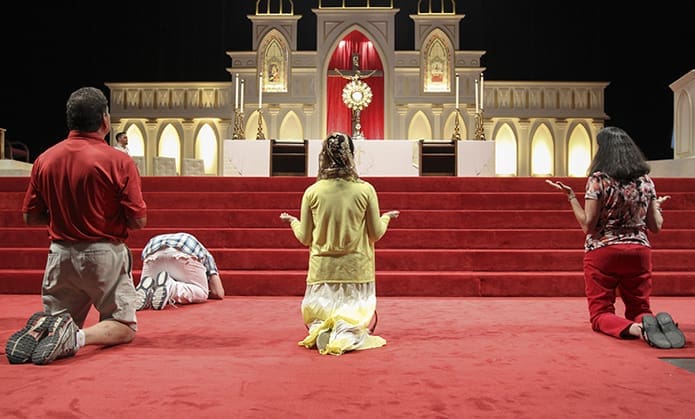At the foot of the altar, some healing service attendees kneel before the Blessed Sacrament during a moment of praise and worship. It marked the opening evening of the 22nd annual Eucharistic Congress held June 16-17 at the Georgia International Convention Center in College Park. Photo By Michael Alexander
College Park
2017 Eucharistic Congress centers on the importance of Christ in the Eucharist
By GRETCHEN KEISER, Staff Writer | Published June 23, 2017 | En Español
COLLEGE PARK—Like Joshua and his family, the thousands attending the 2017 Eucharistic Congress in the Atlanta Archdiocese were urged to make serving the Lord the foundation of their lives.
Archbishop Wilton D. Gregory told them June 17 he hoped the assertion of Joshua about his household was reflected in their minds and hearts as the congress took place. The presence of God is the solid rock in difficult times, he said.
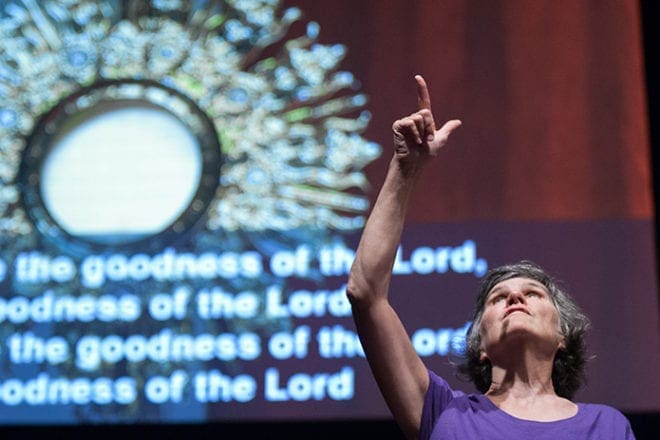
Kathy Byrne, a parishioner at St. Oliver Plunkett Church, Snellville, uses American Sign Language to communicate with those in the deaf community attending the morning Benediction service on Saturday, June 17, at the 2017 Eucharistic Congress. Photo By Thomas Spink
Joshua’s declaration, “As for me and my house, we will serve the Lord,” was the theme of the congress.
“My hope is that this is your determination—your personal goal in these difficult and very challenging times in which we live,” Archbishop Gregory said.
“We need the Eucharist because it is Christ living within us who equips us to live with faith and courage in this unpredictable and sometimes very unfriendly world,” he said.
“On those days when challenges seem too great to overcome or to bear … there is one source of understanding, of strength to keep us moving forward,” he said. “Understanding that is what this congress and all Eucharistic Congresses are about.”
Living lives of faith, sustained by the divine meal of the Eucharist, was the vision for the June 16-17 congress, the 22nd such annual gathering on the solemnity of the Body and Blood of Christ known as Corpus Christi.
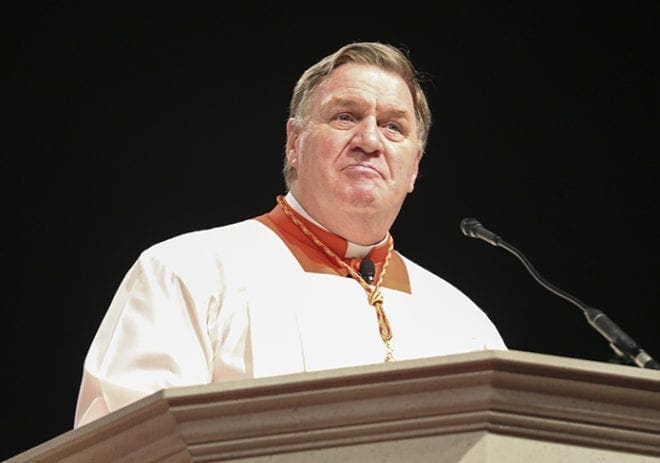
Cardinal Joseph W. Tobin, the archbishop of Newark, N.J., presents his homily to a crowd of about 10,000 people during the Benediction service at the Georgia International Convention Center, College Park. Photo By Michael Alexander
Believed to be the largest assembly of Catholics in the Southeast, the congress focuses upon the true presence of Jesus Christ in the Eucharist and brings together people from all the quadrants, cultures and languages of the archdiocese as the one body of Christ in middle and north Georgia.
The congress spirit began on Friday, June 16, at the Georgia International Convention Center with a project dedicated to those in need. In an effort dubbed Starve Wars II, 100,000 meals were assembled for the West African nation of Burkina Faso by teams made up of family and parish groups, co-workers and individuals. Nearly $30,000 was raised for the hunger project associated with Catholic Relief Services and Justice and Peace Ministries of the archdiocese. It was initiated at the congress last year.
Kathy Montag, Justice and Peace Ministries’ staff member, cited the words of the Catechism of the Catholic Church: “The Eucharist commits us to the poor.”
“We firmly believe that receiving the body and blood of Christ, then caring for the most poor and vulnerable is living a full, Catholic, Eucharistic life, which is what we have been called to do,” she said.
American Catholics face “stark choice”
That evening, more than 3,000 people celebrated the opening Mass offered by Bishop Luis R. Zarama and Bishop-designate Bernard “Ned” Shlesinger. Father Neil Dhabliwala was homilist. Following Mass, people had the opportunity to receive healing prayer at a service led by two archdiocesan priests, Father Michael Silloway and Father Carlos Vargas. Others attended “Revive” for young adults or a program for French-speaking Catholics.
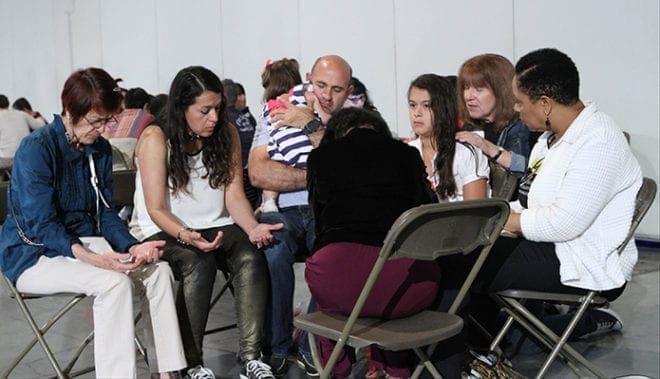
Prayer team members Cherry Ho-On, right, from Church of the Transfiguration, Marietta, and Karen Butz, second from right, of St. Michael the Archangel Church, Woodstock, pray with the Gomez family from Our Lady of the Americas Mission, Lilburn, during a period of intercessory prayer at the healing service June 16. Photo By Michael Alexander
On Saturday, June 17, a full day of congress activities began with a Eucharistic procession of about 10,000 people and Benediction service. The program then diverged into tracks with speakers in English, Spanish, Vietnamese and American Sign Language and those for middle school students and young children. A concluding Mass for the vigil of Corpus Christi was celebrated that evening to close the congress. Throughout the day, an adoration chapel was open and confession was offered in various languages. About 400 volunteers served in dozens of roles to keep the event flowing.
The day began outdoors colorfully and festively as people gathered for the procession. The parking lot reached capacity around 9 a.m. For more than an hour, groups from parishes, missions, schools, ministries, religious and lay congregations flowed into the convention center in College Park carrying over 100 banners, some playing drums, singing, swirling flourishes of streamers, or rattling the beaded leggings worn by matachines dance groups.
When the procession ended, Archbishop Gregory carried the monstrance bearing the Blessed Sacrament into the hall.
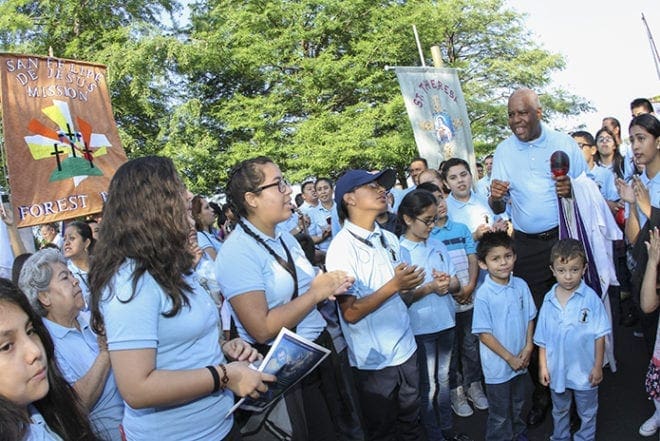
Before the morning procession begins, Father Jacques Fabre, right, administrator of San Felipe de Jesús Mission in Forest Park, stands among some of his younger parishioners as they sing and praise God with the adults in the crowd. Photo By Michael Alexander
The homilist for the morning liturgy, Cardinal Joseph W. Tobin, of Newark, New Jersey, said, “As American Catholics in 2017, our choice whether or not to serve the Lord is as stark as the one that confronted Joshua and his family.”
There is pressure in this country to exclude people and keep people out and to treat some lives as expendable, the cardinal said. This means they also are excluded from the Eucharistic meal. They need to be on the hearts and minds of those at the Eucharist, he said.
“We wouldn’t be faithful to the reason God sent Jesus if we didn’t worry about those who weren’t here,” said the cardinal, a member of the Redemptorist congregation.
Seek deeper understanding of Eucharist
Humanity found it “too risky to believe” in God’s initial covenant of love with them, he said. When that covenant was refused, God “kept trying” and came himself to “live humanity to its depths,” Cardinal Tobin said.
God wanted humanity to see “love spelled out.”
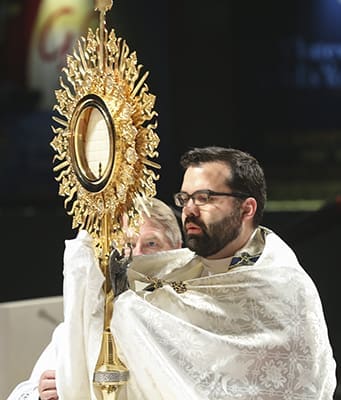
With assistance from permanent deacon Steve Swope of St. George Church, Newnan, background, transitional deacon Jack Knight removes the Blessed Sacrament from the altar in the main hall at the conclusion of the June 17 Benediction service. Photo By Michael Alexander
The sacrament of the Eucharist left by Jesus Christ is “a sacrament of love, a sign of unity … a paschal banquet in which Christ is consumed.”
“We scarcely can believe it when we hear, ‘Body of Christ, Blood of Christ.’ We say, ‘Amen.’ Count us in,” the cardinal said.
John’s Gospel recounts that at the Last Supper Jesus washed the feet of the disciples. This Gospel “seems to be saying Christ’s presence is equally in service,” Cardinal Tobin said.
But this is only a part of the mystery of the Eucharist, he said.
In 1 Corinthians, St. Paul corrects that church for disunity and the self-centered way individuals celebrate the Lord’s Supper. The apostle writes that they are in danger of receiving the body and blood of Christ unworthily. “Reducing the worship of Christ’s Eucharistic presence to being me and Jesus means it is probably mostly me,” Cardinal Tobin said.
Those present at the congress are called not only to celebrate the Eucharist but to seek to do so with understanding of what Christ intended.
“You will worry about those who aren’t here today, those who haven’t yet found a place at the table,” he said.
“Beautiful to see so many, many children”
Father Duvan González, parochial vicar of St. Joseph Church, Dalton, came on a bus with his parishioners who left their church about 6 a.m. for a two-hour ride to the convention center. About 120 came by bus or car, he said. He marched in with them under the parish banner and looked forward to midday when they invited him to share their traditional foods.
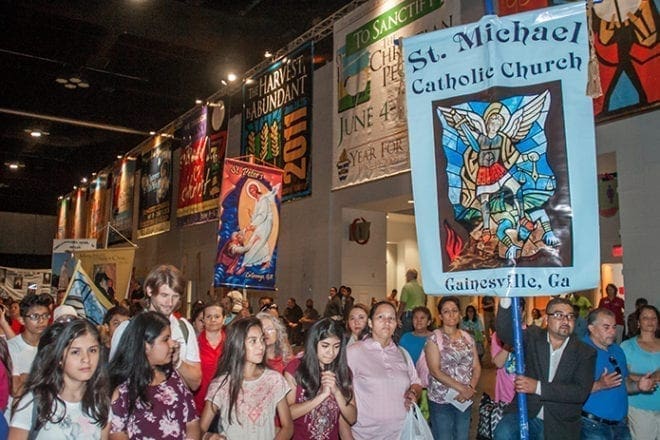
The parish group from St. Michael Church, Gainesville, moves with their colorful banner through the great hall during the Saturday morning procession that kicked off day two of the Eucharistic Congress. The parish brings a group by bus each year to the congress, this year bringing 32, with 11 of them middle school children. Photo by Thomas Spink
“They are very, very happy because in this meeting they understand the church is big and has diversity,” Father González said.
From one of the northern-most counties of the archdiocese, he said the congress plays an important role for families.
“We need to continue it, to support it, to invite the community to participate each year. It is beautiful to see so many, many children with us because in this way we teach them what is the heart of the Catholic Church—the Eucharist,” he said.
How to strengthen the family as the domestic church—and how to pass the faith to the next generation—concerned both speakers and those attending.
Brandon Vogt, author and content director for Word on Fire Catholic ministries, spoke of drawing young adults back to the church by being genuinely interested in what barriers may be keeping them away and seeking answers to their concerns and doubts.
“The church doesn’t nag somebody to fall in love with her. She proposes,” Vogt said.
He also advised giving “seed gifts” of small booklets, prayers, music or other aids that can touch those who are searching when the time is right. Prayer and fasting must be the foundation of any effort to draw people back to the church, he said.
“That was speaking directly to me,” said Mary Carzoli, of St. Ann Church, Marietta, as she waited in an author’s line after the talk. “It gives me new strength in how to speak to my children without nagging.”
She finds the congress a nourishing and encouraging event.
“I come to keep my faith growing and my spiritual life growing,” she said. “Being around other Catholics strengthens you. … The procession, all the different cultures, it is just an amazing event.”
Congress feeds young families
Other speakers in the English language track included Father Michael Gaitley, evangelization director for the Marian Fathers of the Immaculate Conception, Dr. Gianna Molla, the daughter of St. Gianna Beretta Molla, and Father Larry Richards.
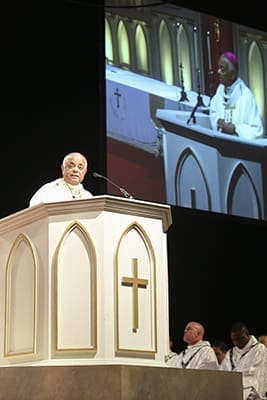
Archbishop Wilton D. Gregory gives the homily during the closing Mass for the 22nd annual Eucharistic Congress at the Georgia International Convention Center, College Park. Photo By Michael Alexander
Naomi and Michael Karrels, of St. Mary Magdalene Church, Newnan, had their 11-month-old daughter, Maria Sophia, with them in a stroller while their two other children, 9 and 6 years old, were in the children’s track.
The congress is very important to them in ministry, Naomi Karrels said.
“I just finished coordinating Vacation Bible School at my church. The Eucharistic Congress is my place to come and recharge. It has become a very important place for me to come every year—for both of us—to recharge individually, to recharge as a couple. It is a sacrifice worth making with the little ones.”
She said the children’s track is vital so families can attend.
“The Eucharistic Congress is what we need to feed young families and young families sometimes need someone to watch the kids for a few minutes so we can recharge and be that light and go out and be whatever the church needs,” she said.
Michael Karrels said just being with thousands of people sharing the Catholic faith was meaningful to him.
“You are amongst the community,” he said.
Kas Ho, of Holy Cross Church, Atlanta, shepherded about 60 children from the Burmese Catholic community who came for the first time to the children’s track on a bus made possible by the parish women’s group and with other parish support.
At one point they surrounded Bishop-designate Shlesinger in a hallway, peppering the future auxiliary bishop of Atlanta with questions.
“I think it is a beautiful thing for young and old. It gives us inspiration and communion,” Ho said of the congress. “For the children, this is their first time. Everything is a wow for them.”
At table “we become more of a family”
Christian Murray, of St. Pius X Church, Conyers, said the entire congress was a great “sacrament of confirmation” that he is doing the right things.
“Sometimes we go in life and focus on a goal, and it goes well for a long time,” said Murray. “Then we start to have vertigo and we wonder if we are doing the right thing. That was the point where I was before the congress. But one after the other, each speaker confirmed I was on the right path and to keep going.”
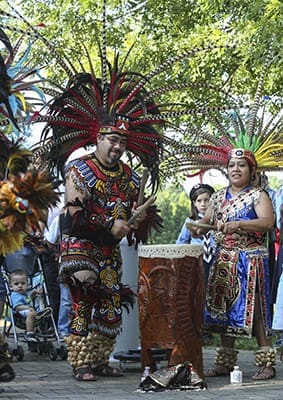
Ana Osorio, right, and Alfredo Avilez play the drum as members of the Anza Azteca Dancers from St. Matthew Church, Winder, perform for an audience of people before the Eucharistic Congress morning procession. Photo By Michael Alexander
A stay-at-home father, who homeschools his children, he said, “A lot of times that desire for success can and does put children aside. But children need a total gift of the parent—not in toys, not in abundance of places to go, but presence. So to me the god of success was one I had to let go.”
The theme of family concluded the congress as Archbishop Gregory gave his homily at the closing Mass for about 10,000 people.
Families experience quarrels, and even in the church, quarrels take place about the Eucharist itself, such as whether to kneel or stand and whether to receive holy Communion in the hand or on the tongue, he said.
When the church of the archdiocese gathers each year for the congress, native dress, songs and languages may differ “but all pale in comparison to the gift that unites us,” the archbishop said.
“When the family of the church gathers to celebrate the Eucharist, we strengthen the bonds that unite us,” he said. “Our hearts are renewed by none other than Christ himself.”
“Whenever we share this precious bread and saving cup, we become more of a family,” he said. In the Eucharist, Christ “nourishes us and sustains us with this gift of his very self and he removes all reason for us to quarrel anymore.”
The archbishop announced that the 2018 Eucharistic Congress will be held June 1-2. The theme from John 17:21 will be “That they may all be one.”
